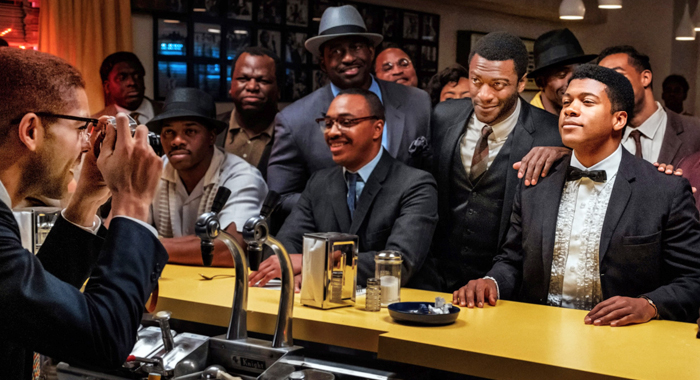After three decades as an actor Regina King’s directorial debut One Night in Miami is a vibrant look at the conflicts and battles that defined the civil rights movement. Adapted from Kemp Powers’ stage play of the same name, the film mostly takes place in an unassuming hotel where four iconic figures meet and discuss how their fame and power can be used to progress the black cause.
Malcolm X (Kingsley Ben-Adir), American footballer Jim Brown (Aldis Hodge), and Sam Cooke (Leslie Odom Jr.) meet the then Cassius Clay (Eli Goree) to celebrate his surprise 1964 title win. Instead of partying, they speak at length in what at times become angered and fractious conversations. It is not just a meeting of minds, but also of personalities that spar off each other and create friction when there is a differing of opinion.
There is a sense that their philosophies are still a work in progress, seen with Clay’s reservations about joining the Nation of Islam and Cooke’s reluctance to tackle political material in his music. Malcolm X’s worldview is unsurprisingly the most developed, but even he cannot evade questioning and moments of doubt. Capturing him just as he plans to leave the Nation of Islam, it is a depiction of Malcolm X that is more anxious and unsure than we have seen before.
The smoky period setting and the theatrical dialogue allow the film to embrace the dramatics of this kind of adaptation, rather than hide behind the drab veneer of the traditional biopic. The central characters are so iconic and recognisable that is it almost impossible to copy or mirror them. Instead each performance gives a sense of their spirit and outlook on the world. The film provides a flavour of the time and the debates that took place in households across the United States. The exchanges are nuanced and cover issues that remain relevant today.
This is best illustrated in an argument where Malcolm X suggests that Cooke should do more with his success and platform to help black communities. Cooke responds by mentioning a song from a musician he manages that was covered by The Rolling Stones. The cover topped the charts and the royalties went to the artist who originally wrote it. What on the surface looked like it undermined the black musician, brought wealth and a certain kind of power to the communities he came from.
Each conversation is given space to be challenged and built upon. They act as an antidote against the reactionary dialogues we have become accustomed to. Ideas and emotions mingle and merge to give a sense that each has learnt from the others’ perspectives, even if they do not openly admit it.
The direction from King is accomplished, particularly in its capturing of mood and setting. Despite it being her first film, she has gained experience directing a number of television shows, including Scandal, Animal Kingdom, and The Good Doctor over the last decade. Having been Oscar nominated for her last film acting credit in If Beale Street Could Talk whatever King does next it will no doubt be highly anticipated.
Review by Wyndham Hacket Pain @WyndhamHP
